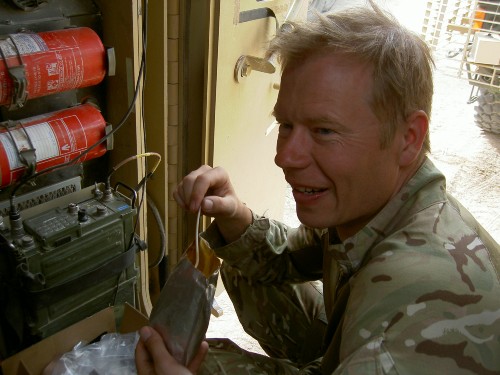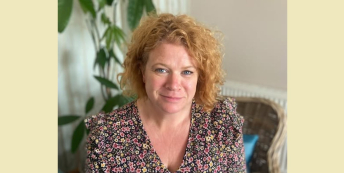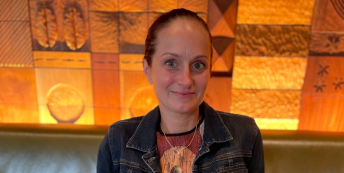“It was time for a new challenge, but also to deliver my family some stability.”

What work were you doing previously?
I joined the British Army as an officer after university and served for eighteen years, reaching the rank of Lieutenant Colonel.
I had served across the world (including Germany, Cyprus, and the Falkland Islands) and completed operational tours in Iraq and Afghanistan.
What are you doing now?
I am coming to the end of my training to become a secondary school history teacher.
I start my first job as a Newly Qualified Teacher in a local comprehensive school later this year.
Why did you change?
Although the Army was an amazing career, I felt I had achieved all that I had set out to achieve when I joined.
As anyone who has served will also recognise, it places incredible demands upon your family. I felt as though it was time to move on to a new challenge, but also to deliver my family some stability.
Teaching seemed like a natural progression for me. I wanted another career that was fulfilling and where I could use the experience and knowledge that I'd gained through my time in the Army.
When was the moment you decided to make the change?
I started looking into teaching as a future career about five years ago, but it never seemed like the right moment to make the switch.
In addition to just being nervous about leaving the only career that I'd ever known, I also wanted to ensure that my family and I were in the right place mentally, geographically, and financially to make the change.
I then reached a point when, instinctively, it just felt right to go. From that point on I could focus on the future.
Are you happy with the change?
Absolutely!
I'd be lying if I said I'd never had doubts, and there were certainly a few sleepless nights early on. I believe it's entirely human to have worries about any significant change of direction like this, especially when you have responsibilities (family, mortgage etc).
However, teaching is an amazing profession. It's rewarding and frustrating in equal measure, but I love the challenge of learning something new every day and knowing that what I do has a tangible impact on young people’s lives.
What do you miss and what don't you miss?
Many of the things that I thought I would miss about the Army exist in spades within teaching (camaraderie, variety, daily challenge, the feeling that you're making a difference) but what teaching has given me is a new, and very different, challenge.
Ironically, the ‘uncertainty’ that came with Army life was one of the reasons I left but it's also one of the things that I'll miss the most.
How did you go about making the shift?
I consulted widely amongst friends (and friends of friends) to try to get an honest idea of what teaching was like.
I also arranged for opportunities to go into schools to experience life in the classroom. This allowed me to paint my own ‘warts and all’ picture, rather than rely upon the glossy one in advertising campaigns.
Selecting my new career early also afforded me time to read and prepare for the shift. My history degree was done over 20 years ago, so there was a lot of reading to do to ensure my subject knowledge was up to scratch.
What didn’t go well? What wrong turns did you take?
I wanted to take some ‘time out’ after the Army before starting teaching.
Unfortunately, the timing of this meant that I ended up having almost a year before I could start my teacher training. This meant I needed to get an interim job (in business change) which almost knocked my whole plan off track as I started to enjoy it!
How did you handle your finances to make your shift possible?
I saved hard towards the end of my Army career to ensure that we had a financial cushion to see us through the teacher training year.
We've also had to be very careful with our expenditure which, at times, has been difficult, especially as it's ‘self-imposed austerity’.
There are grants and bursaries to assist with the transition but as a family we had to accept early on that it was going to be a lean year.
What was the most difficult thing about changing?
For me, the most difficult aspect to the change was accepting that I was back at the bottom of the ladder.
Realising that your years of ‘expertise’ and ‘credibility’ are no longer directly relevant / recognised is hard. This can, understandably, impact on your confidence, especially when you make your first round of mistakes!
What help did you get? 
There is a huge amount of help out there, the trick is knowing what questions to ask when so much is changing at the same time!
The Army has a superb resettlement package designed to help you transition from military service into civilian careers. However, I found this, understandably, very generic and based on an assumption that someone of my rank and experience would want to go into project management or banking!
Within teaching there are several organisations (such as Transition to Teach) that can provide specific help and guidance. Their support has been amazing.
However, my main source of help has been my fellow trainees and teachers. Most teachers are hugely proud of their profession and love to pass on their advice and support. They were all in a similar position once and the empathy shown is a real reassurance.
What resources would you recommend to others?
Transition to Teach.
The Department for Education's Get Into Teaching site.
What have you learnt in the process?
Mistakes are inevitable.
Remain confident in your abilities; no one expects you to be perfect at the start of a new career.
Learn to love your plan. Be confident that it was the right decision, but accept that there will be ups and downs.
It is a cliché, but it's far better to be at the bottom of a ladder that you want to climb than part way up one that you don’t.
What do you wish you'd done differently?
To be honest, very little. I'm still confident that the decisions made have been the right ones.
Ask me again in a year’s time and you might get a different answer!
What would you advise others to do in the same situation?
Have a long, hard, honest think about your values and motivations.
Although work–life balance, job satisfaction and salary are not mutually exclusive, very few jobs can deliver them all. Decide what is important and accept that trade-offs will have to be made in other areas.
Involve your family in the discussions and decision making, and ensure that you all understand the sacrifices that will have to be made.
Recognise that you will have ups and downs but have the confidence to weather the storms!
What lessons could you take from Ben's story to use in your own career change? Let us know in the comments below.



